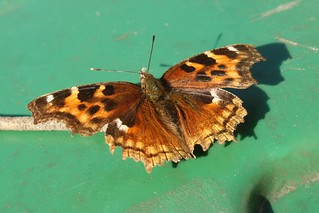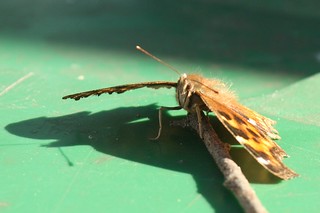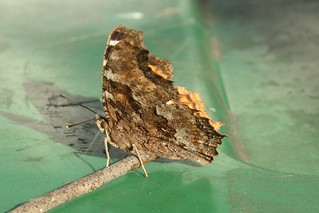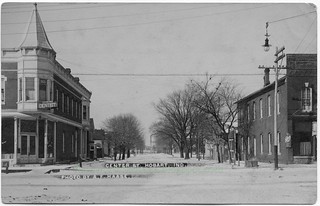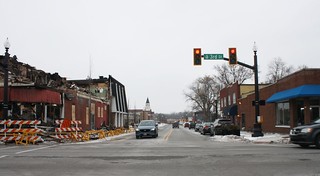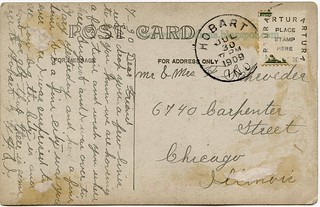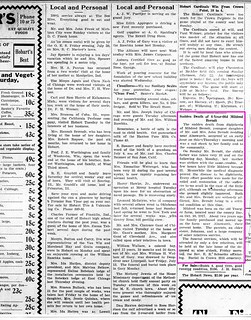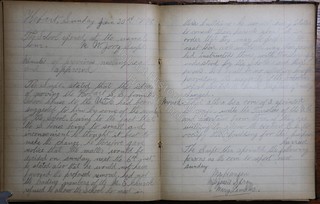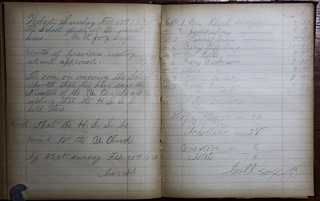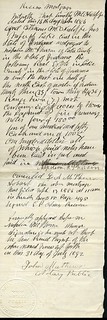
(Click on images to enlarge)
Images courtesy of the Hobart Historical Society and Jocelyn Hahn Johnson.
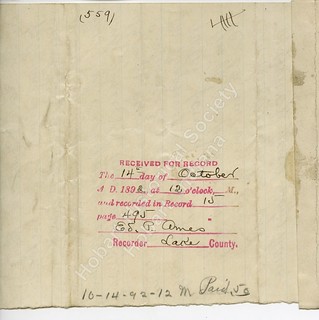
This transaction introduces us to the fancifully named Napoleon McPherson. To learn more about him, let us turn to the eulogy delivered by his friend, William H. Rifenburg, and printed in the Hobart Gazette of July 12, 1895:
OBITUARY Napoleon McPherson was born Jan. 11th, 1826, at London, Franklin Co., Pa., and died at Hobart, July 6th, 1895, making him 69 years 5 months and 26 days old at the time of his death. His boyhood was spent upon his father's farm attending the district school in the winter and working upon the farm in the summer. At the age of 18 he was apprenticed to a Mr. Hastings for 3 years to learn the carpenter's trade and after serving his time he joined a company of emigrants which was made up of his master and neighbors, numbering 42 persons. This company came all the way from Pa. to Galena, Ill., in covered wagons as did so many of the early western pioneers. At Galena he engaged in the lead mining business. He lived in Galena a few years after which he traveled and worked in nearly every state of the Union, generally spending the winters in the south and the summers in the north. In 1854 he settled in Chicago where he commenced work for the I.C.R.R. in their Chicago shops having charge of the wood working department. In Chicago he met his wife, Miss Lucinda Johnson, and from this union came 7 children, two only now living.
The following sketch of Mr. McPherson was read by W.H. Rifenburg at the funeral last Monday [July 8, 1895] at the Unitarian Church.
At the first call for soldiers to defend the flag and maintain the union he listed in Co. A, 12 Ill. infantry. He was in the army about 3 months when he was attacked by inflammatory rheumatism, sent home and discharged from the army. He has been a constant sufferer from that time until his death. After trying every known remedy and spending nearly all of his property in the vain pursuit or relief from his terrible suffering, he came to Hobart to live, thinking he had found a quiet place to end his earthly existence. This was in 1874, about 21 years ago, since which time he lived among us as a neighbor and friend. I became acquainted with him when he first came, I can't remember exactly how nor when, but probably in a business way when he came to live in town. I was intimately acquainted with him, I always enjoyed his company very much.
He was in many ways a remarkable man in spite of his long and intense suffering. His mind was always clear and active. He had no difficulty in reading and digesting the most difficult scientific books. I got him interested in the study of evolution and from the time he commenced to read Darwin's works he was never tired of studying and explaining them. He always seemed so pleased to think that he had found a reasonable and a rational theory for the origin of Life from the potentiality of matter, co-ordinate with all life — God.
As to his religious side, I think I was closer to him than any other person. On all the superstitions that enter so largely in the religious beliefs of so many, he was positively free. He believed in the universality of law and order, in the universe without a break, in matters that are unknowable. As to what becomes of us after death he could probably be called an agnostic. He put much more stress on an upright life than upon the acceptance of any dogma. In his dealings he was honest to the last cent and in his opinions he was outspoken and had nothing to conceal. If the world had more such men, we would have fewer hypocrites. If all dealt like him jails and prisons could be done away with.
I want to take this opportunity to say that to the everlasting credit of the family they have made every possible sacrifice and have lovingly administered to his every wish and want, during his 30 years of suffering. What a satisfaction it must be for them to look back upon a duty so well and faithfully done. In this short biography I have endeavored to tell the truth and in doing so hope I have not given offense.
Only in the 1880 Census do we find Napoleon's family together in Hobart: he and his wife, Lucinda, with their two surviving children, Frank (20 years old), and Harriet (11). Napoleon gives his occupation as carpenter, but in the column where the enumerator is asked to specify any disease that may have the named person "sick or temporarily disabled, so as to be unable to attend to ordinary business or duties," we find a scribble that looks like "Rheumatism."
In 1897, Napoleon's widow, Lucinda, married Sylvester Hampton (Indiana Marriage Collection). Naturally, this marriage produced no children, and when Lucinda died in 1915 (Indiana Death Certificates), she was buried beside her first husband, under his surname … or so we learn from the Northwest Indiana Genealogy Society's book of gravestone readings, and we have to rely on that, since the gravestones themselves are too worn to be legible now.
This, I suppose, is Napoleon's military grave marker …
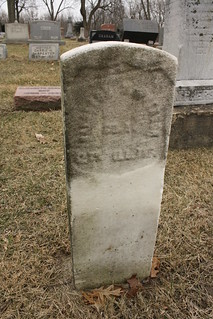
(Click on images to enlarge)
… ordered for him in 1897:
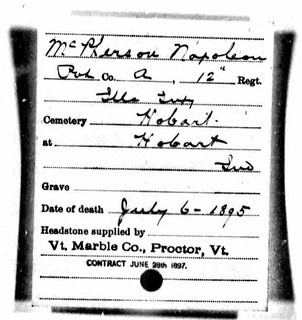
Ancestry.com. Headstones Provided for Deceased Union Civil War Veterans, 1861-1904 [database on-line]. Lehi, UT, USA: Ancestry.com Operations Inc, 2007. Original data: Card Records of Headstones Provided for Deceased Union Civil War Veterans, ca. 1879-ca. 1903; (National Archives Microfilm Publication M1845, 22 rolls); Records of the Office of the Quartermaster General, Record Group 92; National Archives, Washington, D.C.
On this four-sided stone, you can read the name MacPherson, and here and there a word or date.
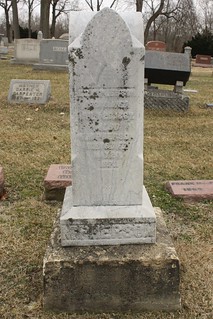
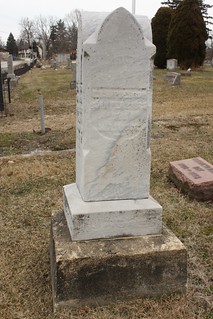
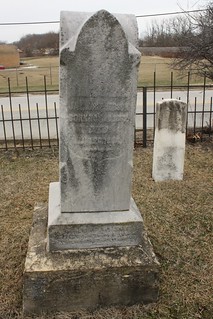
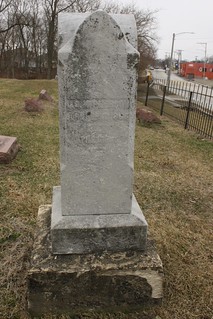
Between the two stones, the Northwest Indiana Genealogical Society says the readers found the following inscriptions:

From Hobart Township Cemeteries, Northwest Indiana Genealogical Society (June 1994).
That would account for the five of their seven children who did not survive (per W.H. Rifenburg's eulogy), but Napoleon and Lucinda were living in Chicago when the children died,[1] so these are probably memorial inscriptions for children whose remains lie elsewhere.[2]
Nearby are the graves of Napoleon and Lucinda's son, Frank …
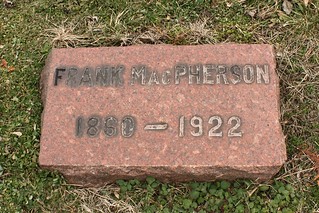
… his wife, Caroline …
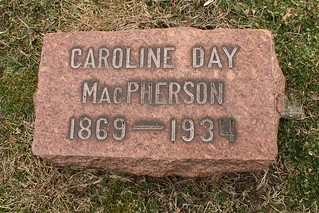
… and their daughter, Edith, who had been the second Mrs. Calvin Scholler:
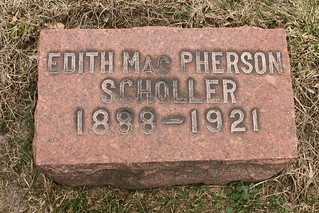
_______________
[1] According to listings in Chicago directories dated 1862, 1865, and 1874; I cannot find them in the 1860 Census or 1870 Census.
[2] The dates, "b. 11-20-1862 d. 4-26-1864," that seem to be associated with Napoleon's name make no sense. Those are not his dates of birth and death, nor the dates of his military service. If this is another child (named after his father), that would bring the total number of children to eight, not seven as W.H. Rifenburg said.

